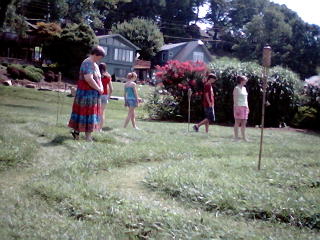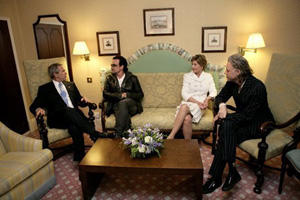From time to time on a fairly regular basis I'll be posting various worship ideas- usually a prayer station that one could use with youth or young adults. Why keep these thoughts to myself, so I'll share them. They may suck, but then again- maybe from time to time we'll have a gem. So here's my first one. And, if you want- you have my permission to use this. Please just email me and let me know that you used it: StPhransus@hotmail.com.
WORSHIP IDEA
THEME: FORGIVENESS, SPIRITUAL GROWTH
SCRIPTURE: MATTHEW 13: 24-29
IDEA: The prayer station helps students understand that their faith and development is a process that they should be growing into. Simply set up a worship space with the materials listed and the sheet below for the student to read, reflect upon, and meditate upon. You might want to provide ambient music while the students are in prayer.
MATERIALS: small flower pots, soil in the pots, paint pens, various kinds of seeds, and the prayer station reflection sheet
REFLECTION SHEET
WEEDS "God's kingdom is like a farmer who planted good seed in his field. That night, while his hired men were asleep, his enemy sowed thistles all through the wheat and slipped away before dawn. When the first green shoots appeared and the grain began to form, the thistles showed up, too.
"The farmhands came to the farmer and said, "Master, that was clean seed you planted, wasn't it? Where did these thistles come from?'
"He answered, "Some enemy did this.'
"The farmhands asked, "Should we weed out the thistles?'
"He said, "No, if you weed the thistles, you'll pull up the wheat, too. Let them grow together until harvest time
.- Jesus of Nazareth (as told by Matthew)
REFLECTIONIf we think of our lives as a large field then we can only imagine what all might be growing in that field. Over a lifetime our field has many variety of plants, flowers and trees. But also in our fields are weeds growing alongside all the life and beauty.
Imagine that the plants, trees and exotic flowers that grow in our fields are the good things about us- our relationship with God, our being a servant to those in need, and our faithfulness to Jesus and his way. These plants started as seeds that were planted by various people and events of our lives- those who have been positive influences, shared and passed along the faith to you, and have been an inspiration.
But alongside imagining about the plants we have to include the weeds. Every field has them. No field is exempt. The weeds came into the field the same way as the seeds- just as people and events have shaped your life in a positive way, certain people, events, media, etc… have been a destructive influence.
We all live with weeds in our fields. Sometimes the weeds get so high and seem to overtake the field in such a way that we feel like our field is not a garden but just a large field of weeds. But Jesus reminds us that these weeds ARE NOT who we are. We ARE Children Of God. God’s love for us is the kind of love that recognizes us for who we are all the while wanting and urging us to continue to focus on the plants, flowers and trees that continue to help us grow in our faith and relationship with Christ.
MEDITATIONBefore you is a pot of soil and seeds. Take two seeds- one the represents the plants, flowers and trees of your life right now and those who planted them, and the other one representing the weeds that you have in your field right now and those events and people that have contributed to them.Plant each seed into the pot of soil and as you do recognize that both are a part of you. After you have finished take a paint pen and write a prayer on the pot asking God for guidance in focusing on the plants in your life and not the weeds. Take your pot with you and put it somewhere prominent as a reminder that God’s love is always with you.


















